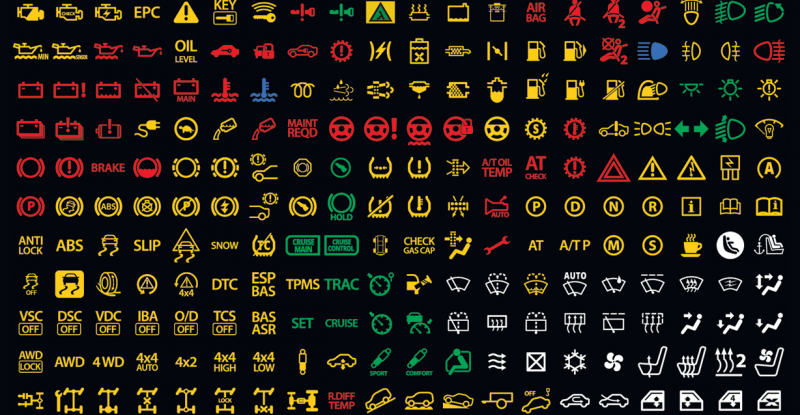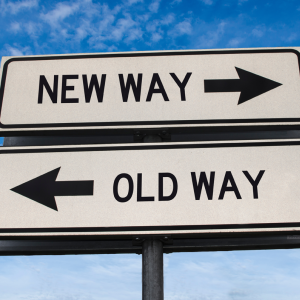
Rebelfit On Mental Health And Depression!
posted on: May 02, 2018. posted in: Mindfulness
I'd like you to imagine driving along in your car.
Now anyone who drives knows that the majority of your attention should be firmly on the road. Aware of what is in front, to the side and to the rear of your car at any given time.
We look through the windshield...
We look at our wing mirrors...
We look at our rear view mirror...
To gain an awareness of our environment and drive safely to our destination.
Now I'd like you to think about how often you take your eyes off the road to look at your dashboard.
Sometimes we glance at our speedometer.
Sometimes we glance at our fuel gauge.
Sometimes we glance at our mileage.
And sometimes, although hopefully not too often, a light will flash up on our dashboard warning us of a problem.
Maybe it's a oil light warning us that the car is running low on oil. Maybe it's a frost light warning us that the conditions are slippery. Maybe it's a tyre pressure light warning us that our tyres need a top up.
Most cars nowadays come with at least 60 different types of warning lights, all providing information, data, to the driver about the current status of the vehicle.
But here's the thing.
When we're driving along, it doesn't matter how many of those 60+ lights flash up on our dashboard, our priority is always to keep our EYES ON THE ROAD.
The road is the important bit.
The dashboard is just data.
If the fuel warning light pops up and tells us that the car is about to run out of fuel, we don't zoom in and focus all our attention on that light, taking our eyes of the road.
We're aware of the fuel warning light.
We accept the fuel warning light is there.
We understand it's serving a purpose.
But we keep our eyes firmly on the road, adjusting our course based on the data we've received, usually towards the nearest petrol station.
So it goes something like this...
Warning Light >>
Keep Eyes On Road >>
Adjust Course If Necessary.
__________
In life...
You are the car.
The world around you is the road.
Your feelings and emotions are the dashboard.
A really neat way to think about feelings and emotions is as information, DATA, about your body, the car, and the world around you, the road.
You might be sat in your office and suddenly a "hunger light" pops up, telling you're low on energy and that your body needs fuel.
This is just information. This is just DATA about your internal environment, telling you that you need a top up of calories.
Your boss might come along and tell you that you're not to go to lunch until you've finished the admin she's given you, and suddenly an "angry light" pops up, telling you that your boss is a threat to your precious calorie intake.
Again...
This is just information. This is just DATA about your external environment, telling you that your boss is a possible threat to your energy intake and survival.
A colleague might come along and slip you a chocolate bar because they can see you're hangry and about to assault your boss, and suddenly a "love light" pops up on your dashboard, telling you that this person cares about your survival.
__________
Now here's the really important bit.
You are not the dashboard.
You are the car.
The dashboard, your feelings and emotions, are simply tools to tell you about the status of your car (your body) and the road (the world around you).
Mental ill health occurs when we take our eyes off the road, and spend all of our time focusing on the dashboard.
We need to be aware of our feelings and emotions, but treat them very much the same as information we are given on the dashboard of our car.
Warning Light >>
Keep Eyes On Road >>
Adjust Course If Necessary.
Equally...
Feeling / Emotion >>
Keep Eyes On Road >>
Adjust Course If Necessary.
Going back to our experience in the office, you could feel that anger, zoom into that anger, ruminate on that anger, and allow that anger to consume you to the point where your eyes are off the road and firmly fixed on the dashboard, and suddenly you lose touch with reality.
Or you could feel that anger, recognise that anger, SEPARATE yourself from that anger, and see it as a warning light that maybe you need to adjust course.
And adjusting course might mean eating a bigger breakfast, planning a mid morning snack, or potentially looking for another job if your boss continues to be a pillock.
In this instance, anger is useful DATA about the road, about the world around you. In this case your workplace.
And if you continue to get angry in your workplace, maybe it's time to adjust course and find somewhere else to work.
__________
I've spent many years working with people with depression, and from my perspective I see depression as a situation where so many warning lights have popped up on someone's dashboard, their attention is solely on the dashboard and they can no longer see or enjoy the road.
I've been there myself at times...
Where stress and anxiety and anger and frustration are all pinging up all over the place, and in that moment your focus and obsession moves to the dashboard, putting you in a mindset where you feel you need to isolate yourself from reality and deal with all those emotions.
Depression to me serves a purpose.
It's a state of complete focus on the dashboard, the multiple warning lights, the negative emotions, to the point where isolation and extrication from the world becomes your only option.
Depression is a decision to...
TO COME OFF THE ROAD.
Is that such a bad thing?
Evolutionary perspectives on depression theorise that actually it is an adaptation to our environment.
When our environment keeps throwing problems at us, in the form of multiple warning lights, multiple negative emotions, the depressive state and the decision "to come off the road" is a way of taking some time out to fix the problems.
If 20 different warning lights came up on your dashboard while you were driving, the smart thing to do would be to book your car into the nearest garage and get it fixed.
In this way, depression is a kind of "mental servicing" where the mind is in an isolated, focused state where it can fix the various warning lights before returning to the road. Counselling and other talking therapies are fantastic forms of mental servicing, helping us to deal with each warning light in turn.
However, too often we're being told by medical professionals that natural responses to our environment are "disorders".
Perhaps we need a change of perspective.
Perhaps the modern world is an environment that constantly poses problems for our ancient minds and bodies, causing all these warning lights to pop up at once, more than we were ever designed to deal with.
And perhaps our brains are hard wired to withdraw from the world, to go into a depressive state and to think up a new direction, the moment it is faced with so many warning lights, so many problems.
Perhaps we shouldn't call it "depression".
Perhaps we should call it "solution".
Labelling depressed people "depressed" is just another source of stress, and another warning light, on a dashboard that is already overloaded.
Teaching depressed people that actually they are in a state of "solution" where they need to take some time out, get some help and find a new life direction, feels so much more helpful and so much less stigmatising.
We don't have a depression epidemic.
We have a solution epidemic.
Millions of people looking for the solution on to how to survive and thrive in a modern world that our minds and bodies really aren't designed for.
To me, the secret to improving mental health and reducing incidences of depression starts with our ENVIRONMENT.
It starts with the road.
The modern world is the bumpiest, rockiest, roughest road you can travel, and this is why so many warning lights are popping up and so many people are fixed on the dashboard in a state of depression. Sorry. Solution.
And for me, the solution is the exact same solution you would find if you were to hit a bumpy, rocky, rough road in your car.
Warning Light >>
Keep Eyes On Road >>
Adjust Course If Necessary.
But how many millions of people in this world find themselves stuck on the same rough, rocky road that is throwing up warning lights in the form negative emotions, and they don't feel they can adjust course? They don't feel they can change it?
Medicating might top up your oil or pump up your tyres for a bit, switching off a few warning lights, but if you're still travelling that rough, rocky road you're still in that same environment that's going to keep throwing up warning lights and keep you firmly fixed on the dashboard.
I've lost count of the number of clients I've seen come out the other side of depression, and come off their medication, because they got fit, they got healthy and that had two massive benefits.
1. It proved to them that they're capable of change, and
2. It gave them the energy to make the change.
I don't have all the answers.
But I really do believe that fitness has been a map for millions of people, helping them change direction, and helping them start enjoying the road again, instead of a life fixed on the dashboard.
Liam
p.s. Please remember that I'm just sharing my thoughts and ideas here. I'd love to hear yours too! Please comment if you have any thoughts, experiences or suggestions about mental health and depression.








